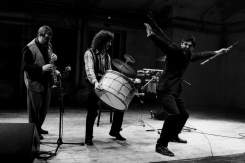
Fairy Tale Trio
Bulharsko
Theodosii Spassov - kaval
Anatoly Vapirov - saxofon
Stoyan Yankoulov - tupan
Tradiční bulharská lidová hudba je nesmírně bohatým hudebním odkazem. V Sofii je
archivováno asi 260 tisíc lidových písní, z nichž 137 tisíc je zapsáno
v notových záznamech a přes 5 tisíc lidových melodií je nahráno
na magnetofonových páscích. Mohli bychom tedy logicky vyvozovat, že trio, které
je tak silně zakořeněno ve velké bulharské hudební tradici, bude reprodukovat
alespoň jednu z těchto písní. Avšak Fairy Tale Trio tak překvapivě nečiní.
Všechny skladby i témata v nich improvizovaná jsou originálními kompozicemi.
Přesto zahrnuje toto trio do své hudby mnoho prvků, kterými se bulharská lidová
hudba vyznačuje: nepravidelná asymetrická metra, vznikající kombinací různých
meter, melodické a rytmické připomínky tance khoro a užívání malých tercií
a septim, což je vlastní také blues a jazzu. Bulharský folklór je zde tedy
transformován v něco vzrušujícího a nového, je to moderní bulharská hudba.
Folklór nemá být objektivem a není tedy manipulován pro potřeby jazzu. Bulharské
hudební kořeny jsou však všudypřítomné jako výchozí bod stylizačního horizontu,
v němž je místo i pro jiné hudební elementy.
Hlavní hybnou silou tria je dialog. Nedílnou součástí tohoto hudebního
partnerství je také improvizace. V takto vymezeném konsenzu je pak dovoleno
všechno: střety a napětí, hudební exkurze mimo rámec stylu a všemožná
propojování.
Fairy Tale Trio hraje moderní bulharskou hudbu, která se vymyká obvyklým
definicím jazzu a folklóru. Ani termín "imaginativní folklór", jímž by se dal
popsat jeho styl nejpřiléhavěji, není dost výstižný. Nejpozoruhodnější je, jakým
způsobem vede trio s pestrými životními zkušenostmi hudební dialog.
Viz též článek Bulgarian Traditional Instruments.
Fairy Tale Trio
Bulgaria
Theodosii Spassov - kaval
Anatoly Vapirov - saxophone
Stoyan Yankoulov - tupan
Traditional Bulgarian folk music commands an exceptionally rich heritage.
Approximately 260,000 folk-songs are archivized in Sophia, 137,000 of which have
been musically notated and over 5,000 folk-melodies are documented on tape
recordings. One could logically assume that a trio so strongly rooted in the
great Bulgarian music tradition would reproduce at least one of these melodies
in their repertoire. Astonishingly, the Fairy Tale Trio does not. All of. the
themes and pieces improvised upon by the three musicians are original
compositions.
Actually the Fairy Tale Trio incorporates in its music many elements common to
Bulgarian folklore: the irregular, asymmetrical meters, produced by the
combination of different meters; the melodic and rhythmic allusions to the
khoro-dance, and the use ofdiminished thirds and sevenths, so reminicent of the
blue notes injazz. And yet Bulgarian folklore does not appear here verbatim, but
is transformed through the dialogues of this trio into something exciting and
new: a modern and contemporary Bulgarian music.
Folklore is not the objective here. It is not manipulated to conform to the
needs of jazz. Quite intentionally the Fairy Tale Trio does not revert to known
themes of traditional Bulgarian music. They are not allegated to a source of
material to improvise upon. Even so, the roots of Bulgarian folk music are
omnipresent - as spirit, as allusion, as a point of departure in a stylistic
tour d'horizon, in which many strains and styles stand side by side in
equality.
The centrifugal force of the trio lives and breathes from the idea of musical
dialogue. Equality as the basis of musical partnership is the fundament of their
improvisations. Within this consensus everything is allowed: clashes and
frictions as well as convergences; musical excursions above and beyond the
limitations of style and hybridization.
The Fairy Tale Trio creates a new, modern Bulgarian music which defies the usual
definitions of jazz and folklore. Even the term 'imaginary folklore', which
nearly describes their style of music, is still insufficient. Most remarkably,
the music of the Fairy Tale Trio is infused with the ongoing dialogue between
three musicians of extremely varied life experiences.
See also article Bulgarian Traditional Instruments.
